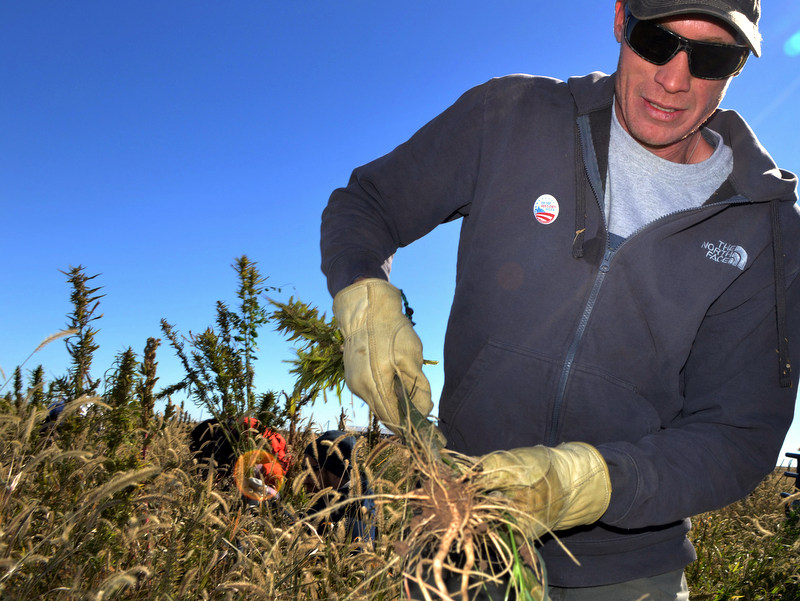Source: mintpressnews.com

In this Oct. 5, 2013 photo, Colorado farmer Ryan Loflin harvests hemp on his
farm in Springfield, Colo. (Photo: Solomon Banda)
CARSON CITY, Nevada — Last week, Nevada became the latest state to pass a bill supporting the cultivation of industrial hemp, a valuable cash crop that became illegal thanks to the American war on drugs.
The bill, sponsored by Democratic state Sen. Tick Segerblom, unanimously passed both chambers of the Nevada Legislature before reaching the governor’s desk.
“The bill will allow colleges, universities, and the state Department of Agriculture to [cultivate] industrial hemp for research purposes under an agricultural pilot program,” Thomas H. Clarke writes in The Daily Chronic, a website dedicated to cannabis law reform.
Federal regulations had banned domestic hemp cultivation until an amendment to the 2014 Farm Bill allowed limited research into the crop. Under the new regulations, large-scale cultivation is still illegal but research by state agricultural boards and universities is now allowed. The move was hailed as a limited victory by advocates for cannabis law reform.
“There are a lot of people anxious to grow hemp, and this won’t really solve that,” Eric Steenstra, president of Vote Hemp, told The Daily Chronic at the time of the bill’s passage. “We will be able to get some crops in the ground and show that hemp is not the boogie man we feared, but commercial farmers still won’t be able to grow it.”
Industrial hemp is a form of the Cannabis sativa plant with very low levels of THC, the main active ingredient that makes pot smokers “high.” The plant can be used to make a wide variety of products, from paper to clothing to fuel. Cultivating hemp is a human tradition dating back 12,000 years or more. The history of hemp in the U.S. is as old as the nation itself — it was grown by several U.S. presidents for industrial use and was crucial to rigging the country’s earliest naval vessels such as the U.S.S. Constitution. During World War II, U.S. farmers were actively encouraged to grow hemp to support the war effort.
“We will be able to get some crops in the ground and show that hemp is not the boogie man we feared, but commercial farmers still won’t be able to grow it.”
More than 30 nations grow industrial hemp, with China secure as the world’s largest exporter of hemp. But U.S. farmers have been left out in the cold for decades, thanks to the U.S. war on drugs, which refused to make any distinctions between recreational use of cannabis and agricultural and industrial use of low-THC hemp. Hemp must be imported, typically from China or Canada, with $11.5 million in hemp products legally imported in 2011
The hemp industry is growing in Colorado, where farmer Scott Perez told the Durango Herald, “Industrial hemp is on the verge of becoming an agricultural revolution.” Kentucky also recently began a hemp pilot program, and Pennsylvania hopes to be next, while Indiana has struggled with federal hurdles preventing the success of its pilot hemp program.
Indeed, support for a total end to the hemp ban is mounting, with Oregon Sen. Ron Wyden calling for reform in Congress last Thursday while displaying a host of hemp-based products made in his state:
“‘In my view, keeping the ban on growing hemp makes about as much sense as instituting a ban on portobello mushrooms,’ Wyden, who introduced a hemp legalization bill earlier this year, said on the Senate floor. ‘There’s no reason to outlaw a product that’s perfectly safe because of what it’s related to.’”
Watch “Hemp For Victory,” a 1942 US Department of Agriculture documentary on industrial cannabis:
No comments:
Post a Comment